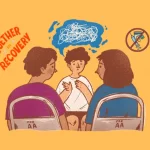
Supporting a loved one facing addiction can be challenging, but it’s also incredibly important and rewarding.
Addiction is a complicated problem that impacts the addict as well as their friends and family. From setting boundaries to offering encouragement, there are various ways you can be a positive influence in their life.
We’ll go over useful tips and advice in this article to assist you in going through this journey with confidence and understanding.
Self-Care:
When helping a loved one who is addicted, you must look after yourself. You must prioritize your physical and mental health to provide effective support. To keep yourself healthy, eat well, exercise frequently, and get adequate sleep.
To discuss your feelings and experiences, reach out to friends, relatives, or a support group for assistance. Set boundaries to protect yourself from being overwhelmed by the challenges of supporting someone with addiction.
Recharge your energy by remembering to partake in joyful and relaxing activities. By looking after yourself, you’ll be in a better position to support your loved one.
The Reality of Addiction:

The brain and behavior are impacted by addiction, which results in compulsive substance use despite negative outcomes.
Understand that addiction is a neurological condition that affects people’s ability to manage their use of drugs and alcohol. It is not only a matter of willpower. Recognize that anyone, regardless of age, gender, or background, can become addicted.
Realize that addiction requires medical treatment and support to overcome, similar to other chronic illnesses.
Learn More:
Learning more about addiction helps you understand its complexity and how it impacts individuals and their families. Explore reliable resources such as books, articles, and reputable websites to gain insights into addiction and available treatment options.
Join support groups or workshops to meet people going through similar things and gain insight from their viewpoints. Keep an open mind and be willing to challenge any misconceptions or stigmas surrounding addiction.
The more you learn, the better equipped you’ll be to offer support and encouragement to your loved one on their journey to recovery.
Avoid Manipulation:

Being aware of manipulative behaviors associated with addiction is crucial in providing support. Establish firm limits and enforce them to keep others from taking advantage of you.
Recognize common manipulation tactics such as guilt-tripping, lying, or making empty promises. Refuse to participate in activities that could unintentionally feed the addiction. In your dealings with your loved one, promote accountability and honesty.
Remember that while you want to offer support, you are not responsible for fixing or controlling their behavior. You may help your loved one without giving in to pressure if you remain watchful and set appropriate limits.
Support Wisely:
Offering encouragement and empathy while avoiding enabling behavior is essential when supporting a loved one with addiction. Provide them with resources for available treatment choices and encourage them to seek professional assistance.
Actively listen to them and accept their emotions without passing judgment. Instead of berating or assigning blame for their addiction, concentrate on letting them know you are concerned and ready to assist. Understand that recovery is a journey that may involve setbacks, and offer support and encouragement along the way.
Encourage healthy habits and activities that promote well-being, and be patient as your loved one navigates the challenges of addiction recovery.
Long-Term Support:
Long-term support is vital for individuals recovering from addiction, as it is a journey that requires ongoing commitment and care. As they traverse the highs and lows of rehabilitation, lend a sympathetic ear and provide emotional support.
Recovering is not a straight line; thus, obstacles can happen. Continue to understand and encourage them as they strive toward their objectives. Drug rehab in Austin can offer the all-inclusive assistance and resources required for sustained recovery.
Conclusion:
You have a significant impact on their road to recovery by learning about addiction, establishing sound limits, and providing unwavering support. Remember to prioritize self-care and seek support for yourself when needed.
Recovery is a challenging but achievable process, and your consistent presence and encouragement can make all the difference.
Stay engaged, remain hopeful, and continue to be a source of strength for your loved ones as they navigate their path toward healing.
About The Author:
Stacey Smith is a freelance health writer. She is passionate about writing about women’s health, dental health, diabetes, endocrinology, and nutrition and provides in-depth features on the latest health news for medical clinics and health magazines.




